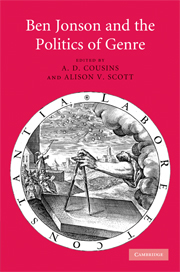Book contents
- Frontmatter
- Contents
- Notes on contributors
- Acknowledgements
- Introduction
- Chapter 1 Feigning the commonwealth: Jonson's Epigrams
- Chapter 2 The Jonsonian masque and the politics of decorum
- Chapter 3 The politics (and pairing) of Jonson's country house poems
- Chapter 4 Style, versatility, and the politics of the epistles
- Chapter 5 Jonson's politics of gender and genre: Mary Wroth and ‘Charis’
- Chapter 6 Jonson's metempsychosis revisited: patronage and religious controversy
- Chapter 7 Jonson's humanist tragedies
- Chapter 8 A generic prompt in Jonson's Timber, or Discoveries
- Bibliography
- Index
Chapter 3 - The politics (and pairing) of Jonson's country house poems
Published online by Cambridge University Press: 30 June 2009
- Frontmatter
- Contents
- Notes on contributors
- Acknowledgements
- Introduction
- Chapter 1 Feigning the commonwealth: Jonson's Epigrams
- Chapter 2 The Jonsonian masque and the politics of decorum
- Chapter 3 The politics (and pairing) of Jonson's country house poems
- Chapter 4 Style, versatility, and the politics of the epistles
- Chapter 5 Jonson's politics of gender and genre: Mary Wroth and ‘Charis’
- Chapter 6 Jonson's metempsychosis revisited: patronage and religious controversy
- Chapter 7 Jonson's humanist tragedies
- Chapter 8 A generic prompt in Jonson's Timber, or Discoveries
- Bibliography
- Index
Summary
The politics of Ben Jonson's two country house poems – ‘To Penshurst’ and ‘To Sir Robert Wroth’ – are an important but complicated topic. The first difficulty, of course, is how the term ‘politics’ shall be defined. Will it be used to refer to whatever political views Jonson himself may have intended to express in these poems? Or will the term refer to the various possible political responses the poems could provoke among Jonson's contemporaries? Or, alternatively, will the term primarily suggest much-later and more-recent reactions to the poems by representatives of political approaches – such as Marxism, new historicism, cultural materialism, etc. – unknown (or at least unnamed) in Jonson's day? Or, finally, will the term refer primarily to ‘macropolitics’ (i.e., to issues of ideology, formal governance, or power relations among large social groups) or to ‘micropolitics’ (i.e., to power relations among individuals)? Any of these aspects of the topic would be worth exploring, and many have indeed been the subjects or motives of previous analysis. Politics of some sort are almost impossible to ignore in discussions of these poems; the works invite (almost demand) political responses. Reactions to the poems, however, will depend (and have depended) very much on the contexts readers bring to them.
A brief glance at the history of criticism of these poems will suggest the variety of responses their ‘politics’ have provoked. Thus G. R. Hibbard, writing in 1956 in the seminal article on the country house genre, finds in such poetry evidence of ‘strong ethical thought’ that ‘voices and defines the values of a society conscious of its own achievement of a civilized way of living, and conscious also of the forces that threatened to undermine and overthrow that achievement. The function of the poet in this society’ (Hibbard continues) ‘was to make it aware of itself; and because the poet had a function the relation between poet and patron in these poems is sound and wholesome’.
- Type
- Chapter
- Information
- Ben Jonson and the Politics of Genre , pp. 73 - 90Publisher: Cambridge University PressPrint publication year: 2009



